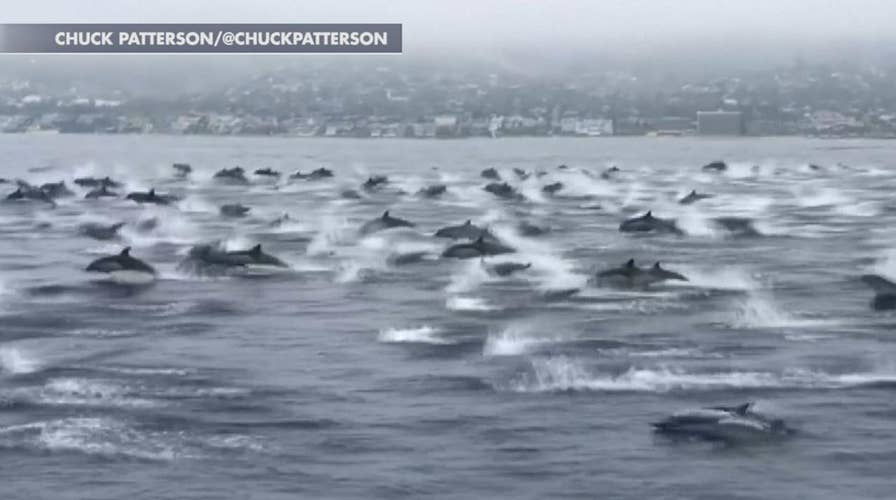Huge pod of dolphins swims alongside boat off the coast of California
Raw video: Boater films large pod of dolphins swimming alongside his vessel near Laguna Beach.
A white Risso's dolphin was spotted Friday by a group of whale watchers off the Southern California coastline.
In a Sunday video from Dana Point's "Dana Wharf Whale Watch," a man on a microphone is heard pointing out the rare animal in a pod of what Fox 35 reported was 30 to 40 other dolphins.
SHARKS USE EARTH'S MAGNETIC FIELD FOR NAVIGATION, SCIENTISTS SAY
In an accompanying Facebook post, the group clarified that the Risso's dolphin is "leucistic" and "not an albino."
"Today at Dana Wharf Whale Watch the sightings included 9 fin whales, 3 humpback whales, 2 Minke whales, Risso's dolphin including a leucistic Risso's, bottlenose dolphin and common dolphin, plus Henry the Masked Booby. On the Ocean Adventures with Captain Chase Moore and deckhand Georgina Stone, we saw Risso’s dolphin on our first three trips today," wrote naturalist Laura Lopez.
"This included a mixed pod of both bottlenose and Risso’s and also a leucistic Risso’s dolphin. This dolphin has been seen at least three times since 2018 from San Diego to Catalina and most recently off Laguna Beach earlier this week," she explained.
The Merriam-Webster Dictionary defines leucism as a genetic condition that results in reduced pigmentation and is caused by a genetic mutation that inhibits melanin and other pigments.
Unlike albinism, the U.S. Navy Marine Species Monitoring blog says, leucistic animals "tend to retain some pigment in their skin and often have dark, normal colored eyes."
According to NOAA, Risso's dolphins – sometimes called gray dolphins – are found in "the temperate and tropical zones of all the world’s oceans" and usually prefer deep offshore waters.
The dolphins can weigh up to 1,100 pounds, are up to 13 feet long and live for 35 years or more in the areas surrounding Alaska, New England, the Mid-Atlantic, the Pacific Islands, the Southeast and the West Coast.
CLICK HERE FOR THE FOX NEWS APP
The agency says that Risso's dolphins are typically found in groups of between 10 and 30 animals and occasionally associated with other dolphins and whales.
Although they are not listed as endangered or threatened, they are protected under the Marine Mammal Protection Act.











































